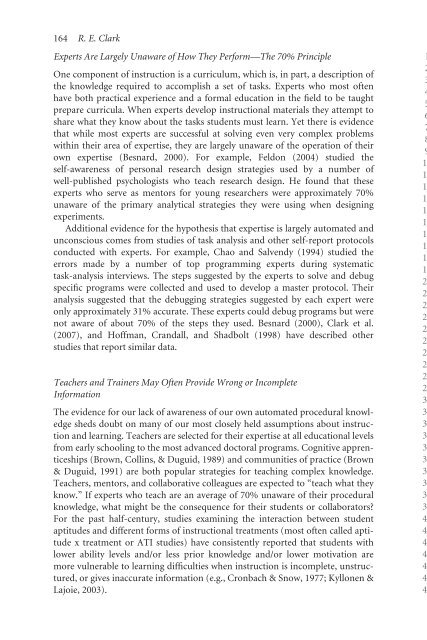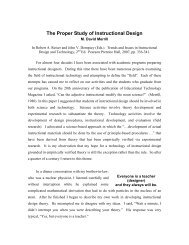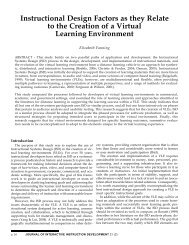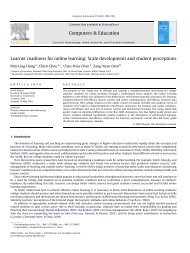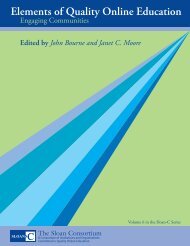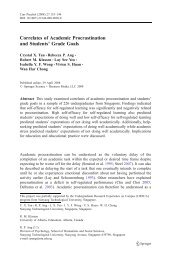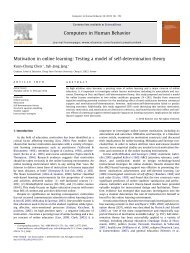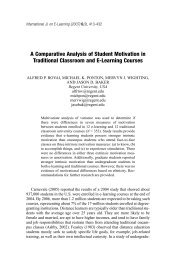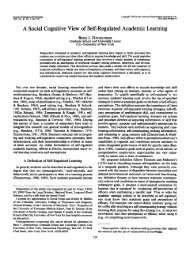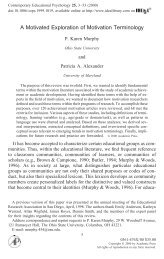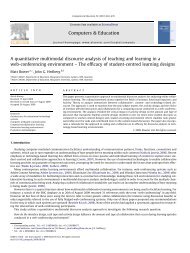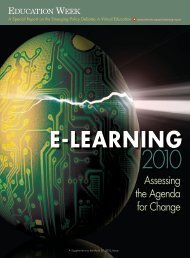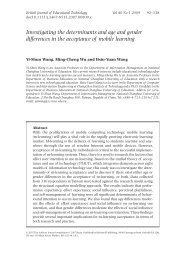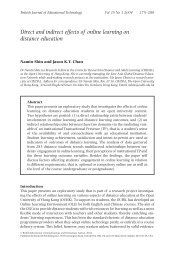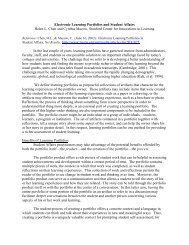<strong>How</strong> <strong>Much</strong> <strong>and</strong> <strong>What</strong> <strong>Type</strong> <strong>of</strong> <strong>Guidance</strong> <strong>is</strong> <strong>Optimal</strong>? 1630123456789012345678901234567890123456<strong>for</strong>m <strong>of</strong> procedures that accompl<strong>is</strong>h goals <strong>and</strong> that declarative knowledge <strong>is</strong>sometimes useful to fill in the m<strong>is</strong>sing steps <strong>of</strong> already- learned productions.ACT- R also suggests that with use over time, productions become automated<strong>and</strong> unconscious but declarative knowledge <strong>is</strong> processed in working memorywhere activity <strong>is</strong> consciously recognized. ACT- R specifies that whenever we recognizethe conditions that reflect a per<strong>for</strong>mance goal, per<strong>for</strong>mance <strong>is</strong> initiatedthat draws on available productions. When the goal <strong>is</strong> to learn or solve aproblem, we apply the goal- directed productions we have available <strong>and</strong> if availableproductions are incomplete or inadequate we use declarative knowledge t<strong>of</strong>ill in the m<strong>is</strong>sing steps. If instruction provides the necessary steps to fill the gap,learning occurs faster <strong>and</strong> more effectively (e.g., with fewer per<strong>for</strong>mance errors)than if we must fill in the gaps using declarative knowledge (Velmahos et al.,2004; Clark & Elen, 2006). Yet our awareness <strong>of</strong> per<strong>for</strong>mance <strong>is</strong> limited to thedeclarative knowledge we have processed in working memory because productionsare automated <strong>and</strong> unconscious so that they circumvent the limits onworking memory (see, <strong>for</strong> example, an engaging d<strong>is</strong>cussion <strong>of</strong> th<strong>is</strong> process in achapter on consciousness by Kihlstrom, 1987, <strong>and</strong> in Sweller’s 2006 description<strong>of</strong> Cognitive Load Theory).Self- awareness <strong>is</strong>, in part, the capacity to observe our thinking about <strong>and</strong>remembering declarative knowledge. Yet we are only indirectly aware <strong>of</strong> our constantuse <strong>of</strong> automated, unconscious procedural knowledge, which we canobserve only by noticing the consequences <strong>of</strong> its operation. For example, mostadults, when asked <strong>for</strong> the product <strong>of</strong> 6 × 108 will respond “648” without anawareness <strong>of</strong> how they solved the problem. Only the unautomated portions <strong>of</strong>the solving procedure are conscious <strong>and</strong> there<strong>for</strong>e open to conscious inspection.Some readers may have multiplied 100 by 6 <strong>and</strong> added the automated product <strong>of</strong>6 times 8 to get the solution; others may have immediately realized the answer“648.” Those who per<strong>for</strong>med the operation in two conscious steps are morelikely to be aware <strong>of</strong> their cognitive processing than those who have automatedthe entire solution process <strong>for</strong> th<strong>is</strong> type <strong>of</strong> problem.Important to th<strong>is</strong> d<strong>is</strong>cussion <strong>is</strong> recent evidence that the declarative components<strong>of</strong> learning or problem solving may only be the “tip <strong>of</strong> the iceberg.” It <strong>is</strong>likely that the teaching <strong>and</strong> learning <strong>of</strong> most tasks <strong>and</strong> the solving <strong>of</strong> complexproblems require an underst<strong>and</strong>ing <strong>of</strong> a large number <strong>of</strong> task- specific automatedprocesses that support the h<strong>and</strong>ling <strong>of</strong> the conscious components <strong>of</strong>tasks. These unconscious components may be unknown <strong>and</strong>/or ignored byinstructional researchers, teachers, or trainers. Because <strong>of</strong> the severe limits onour working memory, it <strong>is</strong> likely that most mental processes supportingproblem solving <strong>and</strong> learning are automated <strong>and</strong> unconscious (Cowen, 2001;Clark & Elen, 2006; Sweller, 2006; Feldon, 2007). One way to interpret the evidencefrom the past half- century <strong>of</strong> research on d<strong>is</strong>covery learning (Mayer,2004) <strong>is</strong> that the type <strong>of</strong> learning that most effectively supports per<strong>for</strong>mance oncomplex tasks <strong>is</strong> almost completely procedural <strong>and</strong> that experts are largelyunaware <strong>of</strong> how they per<strong>for</strong>m tasks <strong>and</strong> solve problems because expert<strong>is</strong>e <strong>is</strong>largely automated <strong>and</strong> unconscious (Clark & Elen, 2006; Clark, Feldon, vanMerriënboer, Yates, & Early, 2007).
164 R. E. ClarkExperts Are Largely Unaware <strong>of</strong> <strong>How</strong> They Per<strong>for</strong>m—The 70% PrincipleOne component <strong>of</strong> instruction <strong>is</strong> a curriculum, which <strong>is</strong>, in part, a description <strong>of</strong>the knowledge required to accompl<strong>is</strong>h a set <strong>of</strong> tasks. Experts who most <strong>of</strong>tenhave both practical experience <strong>and</strong> a <strong>for</strong>mal education in the field to be taughtprepare curricula. When experts develop instructional materials they attempt toshare what they know about the tasks students must learn. Yet there <strong>is</strong> evidencethat while most experts are successful at solving even very complex problemswithin their area <strong>of</strong> expert<strong>is</strong>e, they are largely unaware <strong>of</strong> the operation <strong>of</strong> theirown expert<strong>is</strong>e (Besnard, 2000). For example, Feldon (2004) studied theself- awareness <strong>of</strong> personal research design strategies used by a number <strong>of</strong>well- publ<strong>is</strong>hed psycholog<strong>is</strong>ts who teach research design. He found that theseexperts who serve as mentors <strong>for</strong> young researchers were approximately 70%unaware <strong>of</strong> the primary analytical strategies they were using when designingexperiments.Additional evidence <strong>for</strong> the hypothes<strong>is</strong> that expert<strong>is</strong>e <strong>is</strong> largely automated <strong>and</strong>unconscious comes from studies <strong>of</strong> task analys<strong>is</strong> <strong>and</strong> other self- report protocolsconducted with experts. For example, Chao <strong>and</strong> Salvendy (1994) studied theerrors made by a number <strong>of</strong> top programming experts during systematictask- analys<strong>is</strong> interviews. The steps suggested by the experts to solve <strong>and</strong> debugspecific programs were collected <strong>and</strong> used to develop a master protocol. Theiranalys<strong>is</strong> suggested that the debugging strategies suggested by each expert wereonly approximately 31% accurate. These experts could debug programs but werenot aware <strong>of</strong> about 70% <strong>of</strong> the steps they used. Besnard (2000), Clark et al.(2007), <strong>and</strong> H<strong>of</strong>fman, Cr<strong>and</strong>all, <strong>and</strong> Shadbolt (1998) have described otherstudies that report similar data.Teachers <strong>and</strong> Trainers May Often Provide Wrong or IncompleteIn<strong>for</strong>mationThe evidence <strong>for</strong> our lack <strong>of</strong> awareness <strong>of</strong> our own automated procedural knowledgesheds doubt on many <strong>of</strong> our most closely held assumptions about instruction<strong>and</strong> learning. Teachers are selected <strong>for</strong> their expert<strong>is</strong>e at all educational levelsfrom early schooling to the most advanced doctoral programs. Cognitive apprenticeships(Brown, Collins, & Duguid, 1989) <strong>and</strong> communities <strong>of</strong> practice (Brown& Duguid, 1991) are both popular strategies <strong>for</strong> teaching complex knowledge.Teachers, mentors, <strong>and</strong> collaborative colleagues are expected to “teach what theyknow.” If experts who teach are an average <strong>of</strong> 70% unaware <strong>of</strong> their proceduralknowledge, what might be the consequence <strong>for</strong> their students or collaborators?For the past half- century, studies examining the interaction between studentaptitudes <strong>and</strong> different <strong>for</strong>ms <strong>of</strong> instructional treatments (most <strong>of</strong>ten called aptitudex treatment or ATI studies) have cons<strong>is</strong>tently reported that students withlower ability levels <strong>and</strong>/or less prior knowledge <strong>and</strong>/or lower motivation aremore vulnerable to learning difficulties when instruction <strong>is</strong> incomplete, unstructured,or gives inaccurate in<strong>for</strong>mation (e.g., Cronbach & Snow, 1977; Kyllonen &Lajoie, 2003).1234567891111111111222222222233333333334444444


